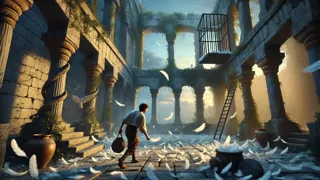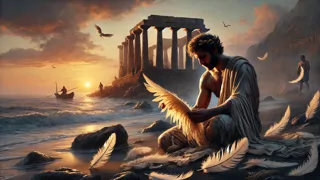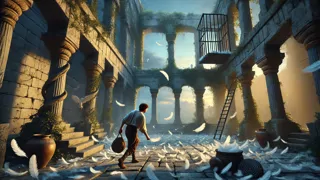Introduction
Long before marble columns gleamed under the Mediterranean sun and epic poems echoed through Athenian halls, there lived a man whose mind spun wonders from the fabric of myth. His name was Daedalus, a master craftsman, inventor, and architect, revered throughout ancient Greece for his ingenuity. But this is not only a tale of brilliance and invention. It is a story of the delicate dance between ambition and wisdom, of a father’s hope and a son’s reckless yearning, and of the cost of forgetting one’s limits. Against the backdrop of Crete’s labyrinthine palaces, where minotaurs once stalked shadowy corridors, Daedalus built more than stone and mortar—he built dreams that dared to reach the sky. Beside him stood his son, Icarus, whose youthful spirit burned with longing for freedom and flight. Together, they would defy the bounds of earth, testing the fragile wings of hope and desire. Their journey would be painted in the golden hues of sunrise and the tragic blaze of noon. From the echoing halls of Knossos to the limitless blue above the sea, their myth endures as a beacon and a warning, shining through centuries. Here unfolds the tale of Daedalus and Icarus: a legend where genius soars, pride falters, and the sun itself becomes both judge and witness.
Daedalus: Master Craftsman in a Land of Labyrinths
In the heart of ancient Crete, where the sea’s turquoise fingers caressed golden sands and olives ripened beneath the watchful gaze of Olympus, Daedalus’ name was spoken with awe. His hands had shaped wonders for kings and gods alike—statues that seemed to breathe, automatons that shimmered with life, and palaces where corridors bent impossibly, leading wanderers in endless circles. Yet for all his fame, Daedalus was a man marked by restlessness. He saw the world not as it was but as it could be—a place where limits might be overcome, if only one dared.

King Minos of Crete, drawn by tales of Daedalus’ genius, summoned him to the island’s bustling palace at Knossos. The king’s will was law, and his ambitions vast. Under Minos’ command, Daedalus designed the labyrinth—a maze so complex that even he, its creator, could barely unravel its secrets. Within its coiling walls, the monstrous Minotaur stalked, a creature born of pride and punishment. As Daedalus gazed upon the labyrinth’s spiraling paths, he pondered the price of serving kings: to build marvels for their glory, yet to become ensnared by their whims.
For years, Daedalus and his son, Icarus, dwelled in Crete, respected but not free. The craftsman taught his boy the mysteries of wood and bronze, the language of wind and fire. Icarus listened with bright eyes, his curiosity unfurling like a sail in the Aegean breeze. But the palace was not a home—it was a gilded cage. Daedalus sensed the king’s suspicion growing, for Minos feared that his secrets might one day slip through Daedalus’ clever fingers. Soon, father and son found themselves prisoners, locked away in a tower that overlooked the restless sea. No wall could contain Daedalus’ mind. Each day, he watched seabirds dip and soar above the waves, tracing freedom across the sky. An idea, fragile as a fledgling, began to take shape. If men could not escape by land or sea, perhaps they could learn from the birds and take to the air. In secret, by lamplight and moonbeam, Daedalus began to gather feathers—long and short, white and grey—fallen from gulls and doves. He taught Icarus to melt beeswax, to sort plumes by size, and to bind them with patient hands. The work was painstaking; mistakes meant disaster. But hope, once ignited, refused to dim. Icarus marveled at each wing’s growing span, his heart beating to the rhythm of imagined flight. Daedalus, ever cautious, reminded him that true invention demanded respect for nature’s laws.
As days bled into nights, the wings took form: two great pairs, feathered and light, supple yet strong. Daedalus tested each joint, each seam, murmuring prayers to Athena for guidance. The world outside faded into silence. All that remained was the dream—bold and impossible—of flying free from the labyrinthine grip of Crete. On the morning chosen for their escape, the sun rose pale and new, washing the sea in gold. In their chamber, Daedalus knelt before Icarus, fitting the wings with trembling care. He spoke not only as a craftsman but as a father, his voice thick with worry and love. "Let us fly as the birds do," he said quietly, "but never forget—neither too high, nor too low. The sun will melt the wax if we rise too far; the sea’s spray will weigh us down if we fall too close. Trust my words, Icarus, for wisdom is the surest guide on perilous paths." Icarus nodded, his youth chafing at caution yet awed by the miracle they’d wrought. Below them, the guards’ footsteps faded. The moment had come.
With wings strapped tight, Daedalus leaped first from the tower’s edge. The wind caught him—steady, buoyant—lifting him above the cliffs. He circled back, urging Icarus to follow. The boy hesitated only a heartbeat, then sprang into the morning air. Together, father and son soared, their shadows skipping across the labyrinth, silent and fleeting. The sea greeted them with salt-laden breezes and the promise of distant shores. Behind them, Crete shrank, its palaces and prisons diminished beneath the boundless sky.
The Flight: Ambition and the Shadow of the Sun
Their wings sliced through the air, gliding over the sparkling tapestry of the Aegean Sea. The wind’s fingers tugged at feathers and hair, filling their ears with the music of freedom. For the first time, Daedalus felt unbound—no stone walls or king’s decrees could reach him here. He stole glances at Icarus, whose laughter soared on the wind, wild and exultant. They passed rocky islets where fishermen paused, shielding their eyes to watch these strange new birds dance in the sky. Dolphins leapt in the ship’s wakes below, and seabirds darted close, curious but wary. The world was limitless, suspended between blue sky and blue water.

Daedalus checked his son often, guiding their course with steady gestures. He kept his altitude measured—not too low, where sea spray threatened to soak the feathers, nor too high, where the air thinned and the sun’s heat grew fierce. Each wingbeat brought them farther from Crete and closer to hope. Yet for Icarus, the thrill was intoxicating. He felt the air ripple beneath him, felt the sun’s golden warmth on his face. The warnings faded in his mind, replaced by wonder. The horizon beckoned—distant, dazzling, unreachable but inviting. What might it feel like to soar higher than any bird? To touch the very edge of heaven?
As Daedalus led their flight, he noticed Icarus drifting upward, drawn by youthful curiosity. “Stay close!” he called over the wind, his voice laced with fear. But Icarus was swept away by possibility. Higher he climbed, wings beating in bold defiance. The world below shrank—ships became toys, islands mere specks, and his father a distant shadow. He laughed aloud, glorying in the rush of air and light. Above him, the sun blazed in white-hot majesty, its rays sharpening to spears. Icarus reached out as if to grasp it, feeling invincible.
But ambition, unchecked, is perilous. As he soared ever closer to the sun, the wax binding his wings began to soften. Feathers loosened, fluttering behind him like snow. At first he felt only a tremor—a subtle change in the wind’s embrace. Then panic flashed in his chest as the structure beneath him weakened. He beat his wings desperately, but their strength ebbed. The sun’s heat grew merciless, melting the delicate artifice that had given him flight. One by one, feathers slipped away, spiraling toward the sea. Daedalus, glancing back, saw his son falter—arms flailing, voice lost in the endless sky. A cry tore free, ripped away by the wind. Helplessly, Daedalus watched as Icarus tumbled downward, his silhouette spinning through shafts of golden light.
The sea waited below, glittering and vast. Icarus plunged, his wings unraveling as he fell. The waves caught him with a shattering finality, swallowing his dreams and leaving only ripples behind. For a heartbeat, all was silent save the distant keening of gulls. Daedalus hovered above the water, his heart breaking. The sun, indifferent witness to hubris and loss, continued its climb across the sky.
Aftermath: Grief, Memory, and the Return to Earth
Daedalus hovered above the restless sea, paralyzed by heartbreak. Below him, the water churned where Icarus had fallen, then stilled to an unforgiving calm. The sun glared down, bright and relentless, making no distinction between triumph and tragedy. For a long moment, Daedalus simply drifted, his wings heavy with sorrow and regret. The world that moments before had seemed so infinite now pressed in with unbearable weight. Finally, with trembling hands and a heart raw from loss, Daedalus spiraled downward to where the waves had closed over his son. He called out—once, twice—his voice lost in the expanse. All that answered was the whisper of surf against rock.

He gathered what little he could—a handful of floating feathers, a memory of laughter riding on the wind. There was no body to bury, only emptiness where hope had once soared. Daedalus wept, mourning not only Icarus but the innocence that ambition had swept away. Yet even in grief, the craftsman knew he must continue. The living have no choice but to move forward, carrying burdens and lessons alike. With leaden limbs, Daedalus turned toward the distant shore of Sicily. The wings that once symbolized freedom now felt like chains, binding him to memory and regret. Each beat reminded him of what was lost—and what was learned.
When at last he reached land, Daedalus collapsed upon the warm stones. Local fishermen watched in awe as he folded his battered wings and stumbled from the surf, a figure both legendary and tragically human. Word of his flight and his loss spread quickly. Some called him a god among men; others saw only a father bereft. In time, Daedalus built a temple to Apollo in memory of Icarus. There he hung the remnants of their wings as an offering—not a boast of triumph, but a plea for understanding. The feathers fluttered in the breeze, catching light and shadow, whispering caution to all who passed beneath them.
The myth of Daedalus and Icarus echoed across the world. Artists painted their flight; poets mourned their fall. Parents whispered warnings to children dreaming of impossible heights. Some saw in Icarus a symbol of defiant ambition—the urge to transcend boundaries and seize the sky. Others saw a parable of pride, a reminder that wisdom lies in knowing one’s limits. Daedalus lived on, haunted by memory yet guided by hard-won understanding. He became a teacher, sharing his story with those who would listen: that invention is wondrous, but wisdom is its compass; that dreams can soar, but only when tempered by humility.
The Aegean still bears witness to their legend. Sometimes, at dawn, fishermen swear they see white feathers drifting on the tide, glinting gold in the sun’s first light—a silent reminder that the boundary between hope and hubris is as thin as wax stretched on a wing.
Conclusion
The myth of Daedalus and Icarus endures for more than its spectacle of flight or its tragic ending. It is a living mirror, reflecting back our own struggles with ambition and restraint, hope and humility. Daedalus’ brilliance gave shape to dreams once thought impossible, but it was wisdom—born of sorrow—that ultimately defined his legacy. Icarus’ fall is not simply a warning; it is a call to balance wonder with caution, reminding us that every breakthrough carries risks as well as rewards. The sky will always beckon—vast, blue, and mysterious—inviting us to test our wings. Yet wisdom whispers: let your reach be guided by understanding, lest you tumble from the heights you once so ardently sought. The story of father and son is written in the sunlight that glitters on the sea and in every feathered shadow that drifts across the morning sky—a lesson as timeless as Greece itself.


















